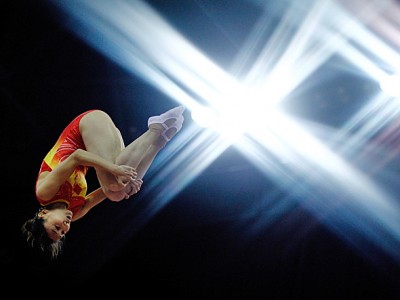
The difference between the right word and the almost right word is the difference between lightning and a lightning bug.
– Mark Twain
A keyboard is a wonderful, liberating device, but in giving us speed it often deafens us to the power of silence. The more often a sentence or paragraph can end on a powerful note, deft and well chosen, the more the writing will inspire readers to connect with the language.
The small break provided by a period represents an opportunity: The reader will focus a little more intently on whatever comes just before that period, so why not take full advantage?
In gymnastics, the goal is often to “stick the landing,” which means flying off the balance beam or vault or parallel bars, twisting here and there, but at just the right time – thump! – coming down squarely, two feet together and flat to the mat, no hopping, no leaning, no falling over. A stuck landing looks like this – watch the video, really, it’s worth it, to come up with a way to visualize what you want your words to achieve. A stuck landing opens up time, the viewer fights off distractions and tune in to that moment; it’s the capper that is what we remember.
Keep in mind these pointers to sticking your landings:
MOT JUSTE: Flaubert famously talked about the importance of “le seule mot juste,” which is translated as “the only right word,” but “mot juste” has come to convey the idea that the art of using precisely the right word becomes like a key to a lock, opening up whole new worlds of understanding. All great writers are masters of the “mot juste,” and the rest of us look to nail word choice whenever we can. When I see an odd pairing of words, when a less astute writer is guessing at language and missing, it’s as if my knees buckle and I begin to labor in staying with the writer.
BALANCE: The opposite of sticking the landing is taking an extra step, an inevitable result of being off-balance. Sometimes it takes real work to pare back a sentence to give greater prominence to the parts that matter the most, but it’s worth the effort.
DON’T DANGLE: Sentences – or paragraphs – that reach a fine high crescendo, but continue on, are best avoided, since really, when you think about it, the thoughts you tack on to the end, like, really, this right here, don’t tend to add much, or even if they do, is it really worth asking the reader to stay alert, or quasi-alert, through what amounts to a kind of restatement, even as the words just keep coming, rolling along, taking you in most any direction, off to the side, around that bend up there, ever farther from the point, which, come to think of it, we lost a long ways back.
ORDERING: If you happen to come up with a particularly juicy construction, chances are you’re best off if it ends a sentence. What we as writers want are those “look away” moments, when someone has your book in hand and pauses to look away from the page, transported by the power of what they’ve just read. Sometimes you have all the elements in place for just such a transporting moment, but if the given passage is immediately followed by distracting verbiage, the reader might be pulled along by annoying duty – and the moment is lost.
– Steve Kettmann
Want to receive Steve’s blog on writers and writing every week by email? Sign up below.

